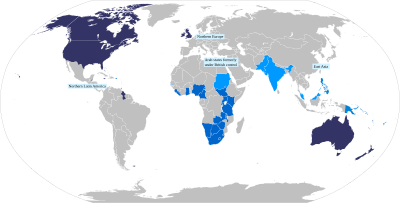
Back أنجلوسفير Arabic Angloesfera AST Anglosfæren Danish Anglosphäre German Αγγλόσφαιρα Greek Angloesfera Spanish Angloesfera Basque فضای انگلیسی Persian Anglosfääri Finnish Pays anglophones French

The Anglosphere, also known as the Anglo-American world,[2] is the Anglo-American sphere of influence, with a core group of nations that today maintain close political, diplomatic and military co-operation. While the nations included in different sources vary, the Anglosphere is usually not considered to include all countries where English is an official language, so it is not synonymous with the sphere of anglophones, though commonly included nations are those that were formerly part of the British Empire and retained the English language and English common law.
The five core countries of the Anglosphere are usually taken to be Australia, Canada, New Zealand, the United Kingdom, and the United States. These countries enjoy close cultural and diplomatic links with one another and are aligned under military and security programmes such as Five Eyes.
- ^ Browning, Christopher S. and Tonra, Ben (2010) "Beyond the West and towards the Anglosphere?" In: Browning, Christopher S. and Lehti, Marko, (eds.) The struggle for the West: a divided and contested legacy. Abingdon, Oxfordshire; New York: Routledge, pp. 161–181. ISBN 9780415476836: https://www.academia.edu/341929/Beyond_the_West_and_Towards_the_Anglosphere Archived 3 January 2023 at the Wayback Machine
- ^ Baylis, John; Smith, Steve; Owens, Patricia (2014). The Globalization of World Politics: An Introduction to International Relations. OUP Oxford. p. 92. ISBN 978-0-19-965617-2.